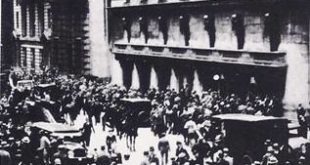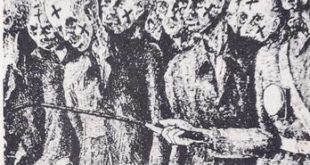Even before the Korean War, the United Nations had proved that it could take effective action to control serious conflicts. It first took such action in the conflict over Palestine. During World War I, the British had ousted the Turks from Palestine. When the war was over, the League of Nations placed that land under the authority of Britain. The British then issued the famous Balfour Declaration, which promised the Jewish people that Palestine would someday become their homeland, but the Arabs of Palestine and the surrounding countries strongly objected to this and year after year passed without the British …
Read More »The United Nations and the Nations Disunited 1943 -1949
So at last, in the Pacific as in Europe, the guns were silent; the nations that had brought so much death and destruction to the world had been defeated, but victory alone was not enough. Governments had to be set up for the defeated nations, the destruction of war had to be repaired, hungry people had to be fed, industry and commerce had to be set in motion. Even more important, a way had to be found to keep war out of the world, to settle disputes between nations by peaceful means rather than by violence. The League of Nations, …
Read More »A World at War 1939 – 1941
Now the people of Europe began to hear a new sound, a sound that would haunt them throughout the years of war — the wail and shriek of air-raid sirens. At night, the lights of Europe went out and the “blackout” made familiar streets strange places of darkness. Street lamps were left unlit and windows were covered with heavy draperies. Any stray gleam of light might help guide enemy bombers to their targets. Hurrying about their wartime duties, the people of Britain and France began to wonder. They had not wanted war and yet war had come. Why? What had …
Read More »“My Name Will Stand Forever” 1933 – 1938
Adolf Hitler, stood above the German town of Berchtesgaden, in a large, imposing house in the mountains and stared out a window. It was a fine February day in the winter of 1938 and the snow-covered peaks of the Alps glistened in the clear air. The man at the window seemed not to see the peaceful mountains. Berchtesgaden was close to the border of Austria and he seemed to see beyond the mountains into the heart of Austria itself — an Austria filled with marching troops‚ cheering crowds and the swastika banners of the Nazis. Staring at this vision, he …
Read More »“On the Dole” 1918 – 1936
IN Europe as in America, the leading democratic nations — Great Britain and France — faced the problems of the great depression. In those nations, too, the question arose: Could democracy survive, or would it give way to totalitarianism? Would the people turn instead to fascism or communism? Although Britain had a brief period of prosperity immediately after World War I, of all the world’s democracies, it was struck hardest and soonest by the depression. For Britain had a special problem. A highly industrialized country, it lived by its exports. It sold manufactured goods and coal to other countries and …
Read More »Panic in Wall Street 1929-1932
AS MILLIONS of Americans hurried to work on the morning of October 24, 1929, it seemed like the start of an ordinary day. It seemed just as ordinary to the brokers and bankers who were entering their offices on New York’s Wall Street. True, the prices of stocks had been falling for several days, but that was nothing to worry about. There were bound to be ups and downs in the stock market and prices would surely rise again. For never before had the United States known such prosperity as it did in the 1920’s. Herbert Hoover, who had become …
Read More »The Meaning of Totalitarianism
So it happened that in many parts of the world people were living under a system of government that came to be called totalitarianism. There were differences in the governments of the totalitarian countries, but they were alike in certain important ways. In each of them, the government was controlled by one political party, usually under a dictator and no other political parties were allowed. The ruling party was not satisfied to control the government; its aim was total control of the life of its people. It controlled the courts and the armed forces, labour and industry, science and the …
Read More »Dictatorship and Civil War 1926-1939
THE END OF World War I brought many changes of government in Europe, but in a number of countries the old aristocrats and landowners still had power and the new governments could not solve the problems that faced them. Among these countries was Poland. A democratic form of government had been established, but conflicts between various parties and their leaders kept it from being very effective. General Joseph Pilsudski had helped to set up the new government of Poland. He retired from public office in 1922, when Poland adopted a democratic constitution. Pilsudski wanted a bigger and stronger Poland and …
Read More »Revolution in a Beer Hall 1923 – 1924
ON NOVEMBER 8, 1923, about three thousand men were sitting at the tables of a large beer hall on the outskirts of Munich. They had come this evening not just to drink beer; they were to hear a speech by Gustave von Kahr. He was the head of the government of Bavaria, one of the states of Germany. Conditions had been bad in Germany since the end of World War I and Kahr’s audience was anxious to learn what the government intended to do. Kahr was still speaking when there was a commotion at the back of the ball. Several …
Read More »The United States and Victory 1915-1918
FEW AMERICANS noticed the advertisement that appeared in the New York newspapers on May 1, 1915. Signed by the Imperial German Embassy in Washington, it reminded Americans that Germany was at war with Britain. It warned that British ships in the water near the British Isles were “liable to destruction,” and that “travelers sailing in the war zone on ships of Great Britain or her allies do so at their own risk.” That same day, the British steamship Lusitania sailed from New York and among the 1,250 passengers were 188 Americans. On May 6, when the Lusitania was off the …
Read More »








